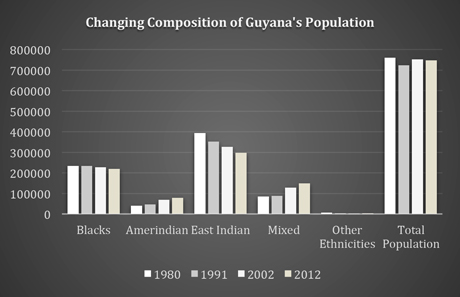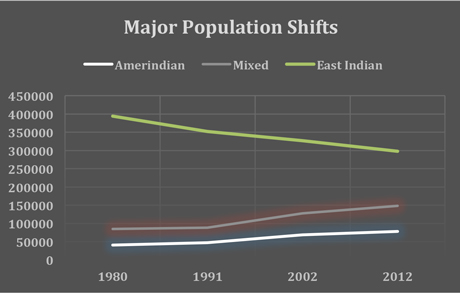Guyana Focus

With general elections in Guyana looming, the changing composition of Guyana’s population could have serious repercussions for the country’s political parties which have historically embraced racially motivated voting.
As a result, unless elections are rigged, the political platform and the track record of the parties will be the main driver of election results as no single ethnic group is large enough to elect a majority government.
The most recent census results – though dated – indicate that the number of East Indians, the largest ethnic group, has declined steadily, from 394,417 in 1980 to 297,493 in 2012, representing a sharp decrease in percentage terms – from 51.93% of the total population in 1980 to 39.83% in 2012.
During the same period, the African/Black population, the second largest ethnic group, has remained relatively stable at 218,483 in 2012, falling marginally from 233,465 in 1980. In 2012, Africans/Blacks comprised 29.25% of the population, down from 30.82% in 1980.
What this means is that although East Indians remain the major ethnic group, the Peoples Progressive Party (PPP) which relies heavily on East Indian votes can no longer depend on its traditional support base for an electoral victory.

Although the African/Black population has remained relatively stable, this ethnic group accounts for only 29.25% of the population, which means that the A Party for National Unity (APNU) which derives its support from this segment of the population, also cannot secure a majority electoral victory based on ethnic support. In fact, it never could have, which is one of the reasons why the current APNU/Alliance for Change (AFC) coalition government emerged victorious at the 2015 general elections.
With the AFC supposedly attracting traditional East Indian or PPP support, the APNU+AFC coalition was well-positioned to win the elections, even though the results were questionable.
But two major shifts in the ethnic composition of the population will also determine the future of the major political parties in Guyana. The first shift is the dramatic increase in individuals of Mixed Heritage, that is, those who do not belong to a distinct ethnic group.

Incidentally, the increase in the population of Mixed individuals will only grow larger over time as these individuals can only have Mixed children, which will effectively result in a permanent shift in the ethnic composition of the population.
Arguably, this is the scenario that is playing out in favour of the APNU+AFC coalition. It is not so much about ethnic cohesiveness as is often portrayed.
The second major shift in ethnic composition is the growth in the Amerindian population, from 40,343 in 1980 to 78,492 in 2012, representing a doubling of this ethnic group from 5.31% of the total population in 1980 to 10.51% in 2012.
Given the decline in the East Indian population and the increase in the Mixed Heritage and Amerindian population, both major political parties are now dependent on the support of these two emergent groups for political support in order to attain power. Racial voting alone cannot dictate victory.
Power in Guyana will therefore rest on the shoulders of the strategies of the individual parties, instead of ethnic loyalties. History has shown that both major parties have been accused of nepotism during their terms in office, accompanied by massive corruption.
The current ruling APNU+AFC coalition which apparently came into power on accusations of corruption within the former PPP administration is now being regarded as being worse than the demagogic regime of the late Forbes Burnham, albeit only after one term in office. Former President Bharat Jagdeo has made open accusations of mistreatment of East Indians, claims which have been rebuffed by the ruling government.
But such claims, true or not, are nothing new in Guyana. When the PPP was in power (1992-2015), Africans/Blacks made vociferous claims of being marginalized, garnering international attention. Now East Indians are making similar claims against the APNU/AFC regime.
What this indicates is that there appears to be a tendency for either major party to show favouritism to its traditional base support. The question is: Can the Mixed component of the population, in particular, and to a lesser extent, the Amerindian population, swing voting in favour of either major party?
Or will a particular party’s promises or track record determine success at the polls? Arguably, with ethnicity becoming a less important factor, the party with the best track record will likely win future elections, unless the polls are rigged, as they have been in all elections in which the PPP did not emerge victorious.
From an ethnic standpoint, all other groups in Guyana, including Chinese, Portuguese, Whites, and unidentified ethnicities make up just over one-half of one percent of the total population and are therefore relatively insignificant in determining the outcome of general elections.
In spite of changes in the ethnic mix of the population, the East Indian component is still 10% greater than Africans/Blacks, and 10% short of a majority government, which suggests that the APNU+AFC coalition is not necessarily in a comfortable position. This is especially true given the fragile nature of the coalition which many believe will fall apart in due course; and the fact that the AFC no longer has the same influence on it's East Indian base as hitherto, when it was originally established.
President of the Central Corentyne Chamber of Commerce, Mohammed Raffik, said the fact that ranks were brave enough to break their silence to journalists means that they are thoroughly disgusted at what has been taking place. “And if the police hierarchy don’t support them and if the Public Security Ministry don’t support them, then we are looking at a situation where all kinds of things can go on in the Force and nobody would be there to police the Force itself,” he said.
“Our chamber is calling on the Ministry of Public Security and the minister himself to have an independent probe into this matter,” Raffik added. “This cannot be done by the police themselves. We are calling on the minister to launch an independent probe into these allegations and these allegations must not be investigated by the police,” he emphasised.
He said that the reason for an independent investigation is because of the seniority of the officer at the centre of the allegations.
Over the past week, Stabroek News has reported on the corruption racket allegations against the senior officer, who was previously stationed in Berbice but is now stationed in Georgetown. Several junior ranks along with a senior rank have detailed several matters and described the modus operandi of the racket which also involves some junior ranks in Berbice. The ranks who spoke out have called for an independent investigation.
Stabroek News reporetd Raffik saying that he believes that President David Granger should get involved. “We have seen the president getting into matters that we consider not as important as this and a lot of things happen. There was another matter where the president sanctioned an inquiry and for us, this is far more important than that first inquiry that was sanctioned by the president. We are also calling on the president to get involved in this matter. The president has a reputation of being a man that is above corruption and he should not spare anyone that is involved in corruption,” the businessman said.
According to Raffik, when the president appointed Leslie James as Commissioner of Police, he told the public that he is a “clean commissioner.”
“While the commissioner may be a man above board, the commissioner is in charge of the police force and so the commissioner and the police should not be involved in this matter. We need an independent probe and it must come from the Ministry of Public Security supported by the Office of the President,” he said
Questioned about his thoughts given that the GPF has been completely silent since the allegations were published in sections of the press, Raffik said, “That speaks volumes because if something as serious as that has been printed by two major newspapers in this country and we have not heard anything from the government or the police, that in itself speaks volumes.”
Mohindra Persaud, the President of the Upper Corentyne Chamber of Commerce and Industry, also supported the call for an independent investigation. He pointed out that many times, residents are afraid to report matters to the police because they might have been aware of the collusion between ranks and criminal elements. He said journalists are the ones who often bridge the gap between victims and police. “The people don’t want to go and report but just go on like nothing happened,” he said.Persaud added that the GPF may be silent because it is as if “their own family” is speaking out on them which may be a hard pill to swallow.
However, he stressed that there is an important and immediate need for an independent investigation to be launched so as to eradicate corruption and bring citizens and the police closer.
Ryan Alexander, Senior Vice President of the Berbice Chamber of Commerce and Development Association, said such allegations are a major concern for the business community and residents of Berbice. “I would like to say the Guyana Police Force has been restructured recently and I am expecting professionalism to prevail,” Stabroek News reported him saying.
He too supported the call for an independent investigation, which, he said, should be sanctioned by the Minister of Public Security in conjunction with the Ministry of the Presidency. “In the effort of transparency, I think an independent investigation should be called for,” he emphasised.
Altabh Khan, the President of the Region Five Chamber of Industry and Commerce, said he believes that after such allegations, an investigation must be launched by the ministry and officers must face the consequences based on the outcome.
Regional Chairman David Armogan also echoed the calls for an independent investigation into the matter. He said that there has always been talk of rogue police officers “who have long been giving information because we have had reports in the past where as soon as the criminals leave, then the police would come and then there [were] other instances which police would come there and protect some of these criminals. There has been many cases both in the past and present where there is collusion between these two sets of people and it’s a question of big money.”
According to the chairman, rogue police officers, who are not interested in the job but money, are easily tempted. “They give information to these criminals and protect them and they get their piece,” he alleged.
Further, Armogan said that while it could be argued that the officers are inclined to do such business for money because of their low salary, “if 90 per cent of officers are satisfied with the salary, I think it’s just the question of being a rogue cop.”
On the allegations that junior ranks within Berbice are aided by a senior police officer, who is in the GPF’s leadership, Armogan said, “Well, you see some of these rogue policemen at the bottom, whenever something happen all what they do is call their bosses.”
He added, “This is a very serious matter; if police who are there to protect you are siding with criminals then we are in real trouble.
“I would ask the Minister of Security, the Commander of ‘B’ Division and the Commissioner of Police to do what it takes to get these rogue elements out of the Force…They are not only giving the police a bad name, they are creating havoc and giving a bad name to the country and to the region too.”
AFC Regional Councillor and Representative for the Office of the Prime Minister in Region Six, Gobin Harbhajan, said based on what is being reported in the press, he also sees the need for an independent investigation. He said that in order to deal with the matter head-on and for transparency, an investigation should be sanctioned by the minister.
He also pointed out that there are many hardworking and honest police officers within ‘B’ Division.
PPP/C Regional Councillor Zamal Hussain said given the fact that allegations have emerged that key police officers are in a “criminal-police network”, he supports the launch of an immediate inquiry independent of the GPF.
“I think it should be impartial because some key officer in the police force is being linked with the junior officers in a network with the criminals…This is very worrying for residents of Region Six and the Minister of Security should ensure we have an independent inquiry and whatever comes out from this inquiry, serious steps should be taken deal with them,” he said.
“Also, I have put it in the press already that the Police Service Commission has planted various persons in divisions to support the government of the day and I think certain policemen are being sidelined because they are not cooperating with these high level ranks,” he claimed.

According to the Concluding Statement of the 2019 International Monetary Fund (IMF) Article IV Mission issued Monday “authorities have indicated their concerns that the absence of a ring-fencing arrangement in the Stabroek Production Sharing Agreement (PSA) could potentially affect the projected flow of government oil revenues.”
The absence of a ring-fencing arrangement in the 2016 PSA has for years been discussed as a possible liability of Guyana’s developing oil sector. Such an arrangement would’ve put “a limitation on consolidation of income and deductions for tax purposes across different activities or different projects undertaken by the same taxpayer.”
It is unclear who in the government signalled this to the IMF mission which visited Guyana from June 3-14 though it is likely to be the Department of Energy (DoE) which took over responsibility for the petroleum sector from the Ministry of Natural Resources.
The admission of the ring-fencing lacuna would be a further indictment of Minister of Natural Resources, Raphael Trotman who presided over the renegotiation of the PSA with ExxonMobil’s subsidiary, EEPGL without addressing a range of key issues. Trotman had at one time described the new PSA as a tweaking of the earlier one but his handling of the process has come under severe criticism for not addressing matters such as ring-fencing, relinquishment of oil blocks, higher royalties and a bigger signing bonus. His being relieved of responsibility for the sector was seen in some quarters as a response to the various problems with the renegotiated PSA. Critics had said that the renegotiation was done without a single recognized expert on the Guyanese side capable of matching wits with ExxonMobil.
In a February 2018 column published in the Sunday Stabroek, economist Dr Clive Thomas noted that in the absence of a ring-fencing arrangement contractors such as Exxon are able to deduct exploration and development expenditures from each new project/well against income from those projects/wells already generating taxable income.
Further, he stated, as petroleum areas mature (because they are mined out), this discourages new investors entering the sector. Particularly, if those investors do not have income against which they can deduct their exploration and development expenditure.
According to the IMF, Government has specifically noted that the rapid appraisal and development of multiple oil fields could affect the timing and amount of profit oil to be shared with the government from a producing oil field by allocating costs from various fields under development to the producing field.
In response, the IMF on Monday said that the authorities are developing strategies to mitigate such a possibility, including a national oil depletion policy to guide extraction and production and clearer ring-fencing rules for new investments.
Analyst Christopher Ram had argued that the Stability Clause contained in the renegotiated 2016 PSA would prevent Guyana from making substantial changes to the agreement.
At a February 11, 2019 press conference, the DoE’s Oil and gas Adviser Matthew Wilks had said that a new PSA template will improve the government’s take overall by instituting elements such as ring-fencing and a more progressive regime as it relates to oil price increases. The template, he said, will also look at closing off potential taxation and value-loss loopholes and “…A general tightening up that will give the government more opportunities to have a say as the investment proceeds from exploration to development and production and the give the government more of a seat at the table.”
The Stabroek Block which is being explored by ExxonMobil’s local subsidiary Esso Exploration and Production Guyana Limited (EEPGL) has a current production estimate of more than 5.5 billion oil equivalent barrels from several wells including Liza , Payara, Liza Deep, Snoek, Turbot, Ranger, Pacora, Longtail, Hammerhead, Pluma, Tilapia, Haimara and Yellowtail.
The company has already begun work on Liza Phase 1 which is expected to produce its first barrels in 2020 while the Environmental Protection Agency (EPA) has provided approval for the development of Liza Phase 2.
Allocation of income
In a November 2017 report, the Fiscal Affairs Department (FAD) of the IMF had pointed out that ring-fencing in a PSA framework can limit the allocation of income and expenditure for profit oil sharing and tax purposes. With such a ring fence, the scope to consolidate income and expenditure across multiple fields is circumscribed.
“In the PSA framework in Guyana, the sharing of profit oil between the contractors and the government is done on a field by field basis. In principle, this ensures that the government revenue from the contract area is calculated based on each field separately. However, this is undone by the PSA framework also allowing the contractor to allocate cost oil to any field within the contract area.
“While Guyana does not place any restriction on the deductibility of interest under the ITA (Income Tax Act), it does impose a withholding tax on interest payments of 20 percent subject to double taxation treaties. Profit oil sharing linked to the cumulative rate of return in contrast would take into account the time value of money, although it is inherently difficult to determine the appropriate rate of return”, the report said.
It cautioned that this asymmetrical treatment of profit and cost oil is likely to benefit contractors with a number of fields within their contract areas at the expense of delaying government revenue. For example, it said that a contractor with multiple fields can significantly lower the amount of profit oil to be shared from a producing field by assigning cost oil from various fields under development to the producing field. This could have “significant implications” in terms of delaying government revenue, particularly if a large, multi-field project is launched in phases.
“Given the size of the contract area thus far awarded in Guyana, there is merit in applying a tighter ring-fencing arrangement as part of the general PSA framework. An option could be to apply this at the level of individual fields, perhaps only allowing failed exploration expenditures to be deducted against producing fields”, the FAD report stated.
Based on Monday’s IMF statement, the government here now seems to be adopting the concerns raised by the FAD in November of 2017.
To advertise in ICW call
Call 905-738-5005